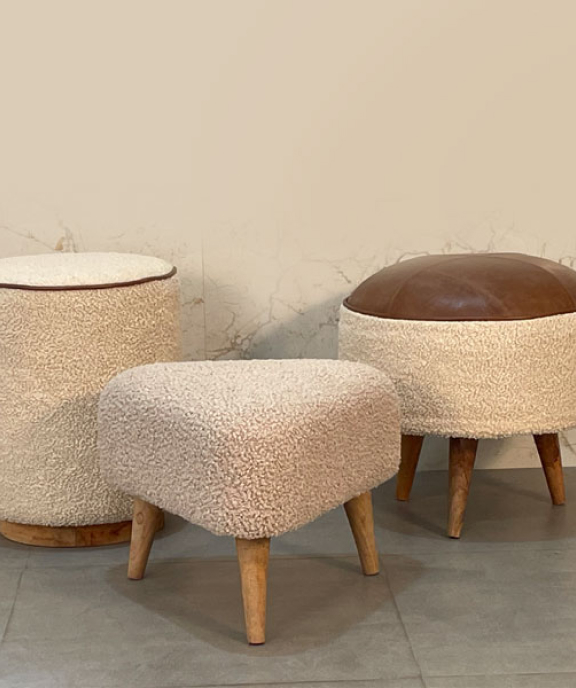Ethical Furniture Sourcing Matters

Ethical furniture sourcing is essential for anyone who cares about the impact of their choices on the world. Have you explored where your furniture originates? The increasing demand for transparency in manufacturing showcases how your decisions can drive positive change.
Embracing ethical practices not only champions fair trade furniture but also supports responsible sourcing methods that significantly reduce environmental harm.
By prioritizing sourced materials, you deepen your connection to the narrative behind each piece.
When you invest in furniture that embodies these values, you create a lasting emotional bond and contribute to a sustainable future.
Click here to learn more about: upholstered furniture
Sustainable Materials in Furniture Design
Exploring sustainable materials unveils a world of innovation in furniture design. By integrating ecofriendly products, such as reclaimed wood, designers give new life to materials that would otherwise fill landfills.
“Utilizing reclaimed wood not only minimizes waste, but it also brings unique character to your space. ”
Bamboo furniture is an exemplary alternative, recognized for its rapid renewability and minimal environmental impact. Brands like West Elm and Greenington are pioneers in this movement, championing sustainable practices that appeal to environmentally conscious consumers.
Benefits of Choosing Sustainable Materials
- Quality furnishings improve your home’s aesthetic while supporting environmental stewardship.
- Artisanal craftsmanship showcases the skill of local artisans, fostering community support.
- Transparency in sourcing ensures you understand the journey of your furniture.
When you choose brands committed to these values, you increase the appeal of your space while engaging in conscious consumerism. Let your selection resonate with sustainability and style, making every piece an investment in a responsible and beautiful living environment.

How Does Responsible Sourcing Impact Quality
Responsible sourcing significantly influences furniture quality. Artisanal craftsmanship flourishes when artisans utilize sustainable materials, resulting in items that not only endure but also showcase remarkable beauty.
For example, Brand X is renowned for its timeless elegance, as it carefully sources from local suppliers committed to eco-friendly practices.
This dedication greatly enhances durability, assuring longevity in design.
Ethically sourced materials yield distinctive aesthetics, appealing to consumers who value exquisite handcrafted designs. Each thoughtfully created piece cultivates a sense of pride and connection, underscoring responsible sourcing’s essential role in achieving high-quality furnishings.
The Benefits Of Fair Trade Furniture
Choosing fair trade furniture signifies a commitment to ethical sourcing and community upliftment.
Local artisans thrive under fair trade practices that guarantee fair wages and safe working conditions. For instance, Brand Y embodies this model, channeling profits back into the communities where they operate, thus enhancing education and healthcare opportunities.
The positive effects of these investments lead to sustainable development and improved infrastructure, nurturing a thriving environment.
Fair trade practices forge a network of trust and support, elevating communities and providing consumers with high-quality furnishings that resonate with their values.
Embracing fair trade furniture is a conscious choice that fosters community development and sustainability.
Responsible Sourcing and Fair Trade Furniture
- Artisanal craftsmanship leads to furniture that is both durable and aesthetically pleasing, enhancing overall quality.
- Fair trade practices ensure local artisans receive fair wages, improving their livelihoods and community well-being.
- Investment in local communities through fair trade contributes to better education and healthcare, fostering sustainable development.
- Ethically sourced materials create unique designs that attract consumers who prioritize sustainability and craftsmanship.
Exploring Reclaimed Wood Options
Reclaimed wood stands as a stunning example of sustainable materials that enhance your home while positively impacting the environment. By selecting reclaimed wood, you significantly decrease the demand for new lumber, which aids in reducing deforestation and minimizing your carbon footprint.
Unique and rich in character, each piece of reclaimed wood carries a history, offering an unparalleled rustic charm.
For DIY enthusiasts, consider crafting an upcycled coffee table; it’s a rewarding project that beautifully marries creativity with eco-friendly practices.
Discover the beauty of sustainability today!
Benefits of Using Reclaimed Wood
- Environmental Impact: Utilizing reclaimed wood promotes sustainability by reducing waste.
- Carbon Footprint Reduction: This choice contributes to a significant reduction in your carbon footprint.
- Artisanal Craftsmanship: Each piece displays unique imperfections, showcasing the beauty of artisanal craftsmanship.
Why Choose Bamboo Furniture For Sustainability
Elevate your living space with the extraordinary benefits of bamboo furniture. Renowned as a champion of sustainable materials, bamboo grows impressively fast—up to 3 feet in just 24 hours! This astounding growth rate makes it a renewable resource that contrasts sharply with traditional woods, often requiring decades to mature. Caring for your bamboo furniture is essential to prolong its lifespan. To maintain its beauty, routinely clean it with a damp cloth and shield it from direct sunlight to prevent fading.
Key Advantages of Bamboo Furniture
Join the bamboo revolution and embrace a stylish, eco-conscious lifestyle that supports sustainability!
- Renewable Resource: Bamboo replenishes itself quickly, making it an eco-friendly choice.
- Durable Furniture: Bamboo is naturally strong and resilient, ensuring longevity in design.
- Low-Impact Design: Opting for bamboo contributes to waste minimization and responsible sourcing.
| Material | Growth Rate | Environmental Benefit | Durability |
|---|---|---|---|
| Reclaimed Wood | N/A | Reduces deforestation | Unique character and history |
| Bamboo | Up to 3 feet in 24 hours | Renewable resource | Strong and resilient |
Understanding Transparency In Manufacturing
Today’s consumers demand accountability in the products they purchase. Transparency in manufacturing plays a significant role as it relates directly to responsible sourcing and high-quality products.
Brands embracing this commitment engage openly with customers about their supply chains, enhancing trust and loyalty.
For example, Patagonia has set a benchmark by fully disclosing its sourcing practices, allowing customers to feel confident in their eco-conscious choices.
As consumer awareness grows, pressure mounts on companies to adopt transparent practices, reflecting a shift toward sustainability and ethical production in the industry.
The Role Of Artisanal Craftsmanship In Ethical Sourcing
Artisanal craftsmanship serves as a bridge connecting consumers to local communities, ensuring that fair trade furniture initiatives thrive. By supporting local artisans, shoppers empower individuals while promoting sustainability.
Traditional crafting techniques yield unique, high-quality products that mass production cannot replicate.
True artisanal brands prioritize transparency in sourcing and authentic storytelling.
Discerning customers can easily identify these brands by seeking their commitment to sustainable practices and responsible sourcing.
These markers enable consumers to make informed choices, supporting both the environment and the livelihoods of skilled artisans.
Embrace the beauty of handcrafted designs that reflect your values through ecofriendly products and furniture sustainability.
Align your purchases with the principles of conscious consumerism as you choose products that resonate with your ethical vision.
Transparency and Ethical Sourcing
- Consumers are willing to pay up to 20% more for products from brands that demonstrate transparency in their sourcing practices.
- Over 70% of consumers prefer to buy from companies that are committed to sustainability and ethical production.
- Artisanal products can be up to 50% more sustainable than mass-produced items, due to their use of local materials and traditional techniques.
- Fair trade initiatives have been shown to increase artisan incomes by 30% compared to traditional market prices.
Supporting Local Artisans: A Conscious Choice
Choosing to support local artisans is more than just a purchase; it’s a commitment to enhancing community impact. By supporting local artisans, you bolster economic growth while enriching cultural heritage.
Each handcrafted design reflects a dedication to artisanal craftsmanship that connects us to traditions and stories of the past.
Your purchase plays a vital role in keeping money circulating within the community, ultimately strengthening its financial stability.
The Economic and Cultural Benefits
When you invest in local artisans, you contribute to:
- Job Creation: Supporting small businesses fosters employment opportunities.
- Entrepreneurship: Every artisan’s success encourages innovation and creative expression.
- Cultural Preservation: Artisan-made products maintain and celebrate local traditions.
By choosing handmade goods, you embrace conscious consumerism that champions quality over mass production. Investing in these unique items not only enhances your living space but also supports community development.
Discovering Local Talent
Ready to make a difference? Join us in uplifting our local artisans and experience the unique craftsmanship they offer. Here are some ways to find local artisans:
- Explore Community Directories: These resources list nearby artisans and their creations.
- Visit Artisan Fairs: Meet talented creators and see their work firsthand.
- Engage on Social Media: Follow local artisans to discover their latest projects and offerings.
Embrace the art of conscious consumerism and contribute to an economy defined by transparency in manufacturing, sustainable practices, and ethical production by investing in artisan-made products that reflect quality and care.
Local Artisans
- Supporting local artisans can lead to a 50% increase in local economic activity.
- Handmade products often have a lower environmental impact compared to mass-produced goods.
- Artisan businesses contribute to the preservation of cultural heritage and local traditions.
- Investing in local craftsmanship can create up to three times more jobs than investing in large corporations.


